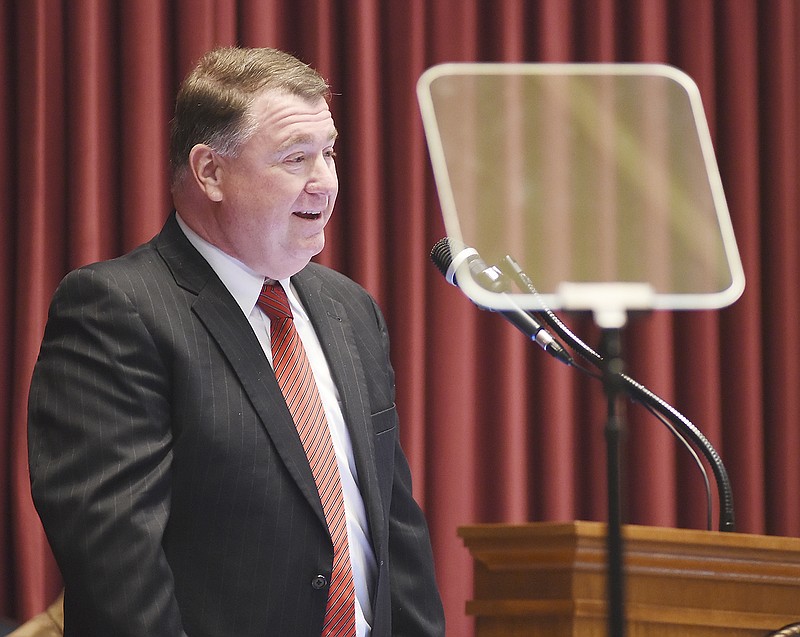Missouri Supreme Court Chief Justice Zel Fischer asked lawmakers Wednesday for more money to help operate the state's courts.
"I know revenues are tight (and) you have important priorities to consider," Fischer said during the 46th annual State of the Judiciary address to a joint legislative session. "But that does not mean your court system and the services we provide are not critical for the health of our state.
"Without reliable availability of courts in your local communities - with fair and impartial judges who are well-versed in the law, and competent, professional court staff - your constituents' complaints might go undecided."
While acknowledging "public opinion tends to galvanize behind particular outcomes," Fischer reminded lawmakers that having fair and impartial courts is important for all - including businesses.
"Small business owners cannot afford undue delay in having their legal matters decided," the chief justice said, "and big businesses look for strong, stable courts when deciding where to employ large numbers of people."
Like many other parts of state government, he noted, "We in the courts have been streamlining our services for years. We've been doing more with less, and I think we have proven that we are a sound investment for your tax dollars.
"But to continue providing a high level of service - now and for the future - we need additional investment in developing our workforce and in improving our technological infrastructure.
He noted Gov. Mike Parson, in his State of the State Address two weeks ago, proposed increasing funding for treatment court operations, including "a restoration of the rest of the core funding to the treatment courts we asked for last year but did not receive," as well as "$3.1 million in additional funding to help expand the reach of our treatment court services."
He urged lawmakers to support Parson's budget recommendations.
"Together, not only can we continue to be smart on crime, but, more importantly, we can continue to save money and lives, " Fischer said.
However, he also asked lawmakers to spend money in the budget Parson didn't recommend - including full-funding for the court's internal programs to educate judges, so they can do their jobs better.
"Right now, our judicial education program operates on 74 percent of the amount of funding to which it is authorized to spend by statute," Fischer explained. "But 74 percent does not allow us to offer as many in-person classes as we need, or to supplement those classes with as many web-based training sessions as we should.
"It will cost just less than a half-million dollars to close this gap between funding authorized and funding appropriated."
And the chief justice encouraged lawmakers to provide more money for technology.
"Technology has become the way we all do business and expect to do business," Fischer said, "but your courts struggle to meet 21st century expectations with 1990s resources.
"The Missouri General Assembly in 1994 mandated the development of a statewide court automation system. But the $7 fee has not changed in a quarter-century, and does not generate enough funds to sustain current functions.
"In fact, the $7 fee actually only pays for one-third of the technology necessary to provide the services that your constituents have come to expect."
The state's electronic court records include:
Case.net, the online system that shows the docket activities for all cases.
Track This Case, which provides information about activity in specific cases, for those who sign-up online for each of the cases they wish to follow.
Pay By Web, which allows people to pay court costs online.
The electronic filing of cases and case documents by all the attorneys involved in each case.
"But what happens if we can't sustain the technology that has become the way we do business?" Fischer asked. "We may find out in 2021, when we anticipate the Missouri courts' statutorily mandated system - built on 25-year-old technology - will be unable to receive critical system updates."
He didn't cite any specific dollar amounts needed for the improvements.
However, Fischer explained: "Equal access to justice requires using technology to resolve disputes fairly and efficiently.
"We need to develop user-friendly, electronic systems to permit citizens to participate in routine court proceedings without missing work.
"We need to increase the functionality of Case.net to allow citizens to be fairly informed.
"Missourians expect your courts to join the 21st century, which will require increased and sustainable funding from general revenue."
The chief justice noted lawmakers hear from their constituents about many issues, but "I don't imagine you have too many constituents calling or emailing you asking for additional court funding.
"If you do, please give them my name and address."

